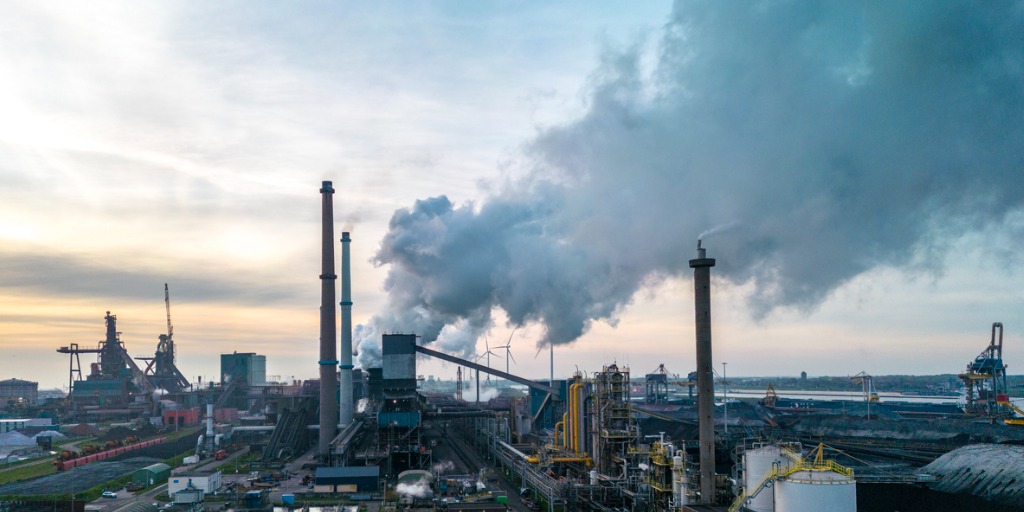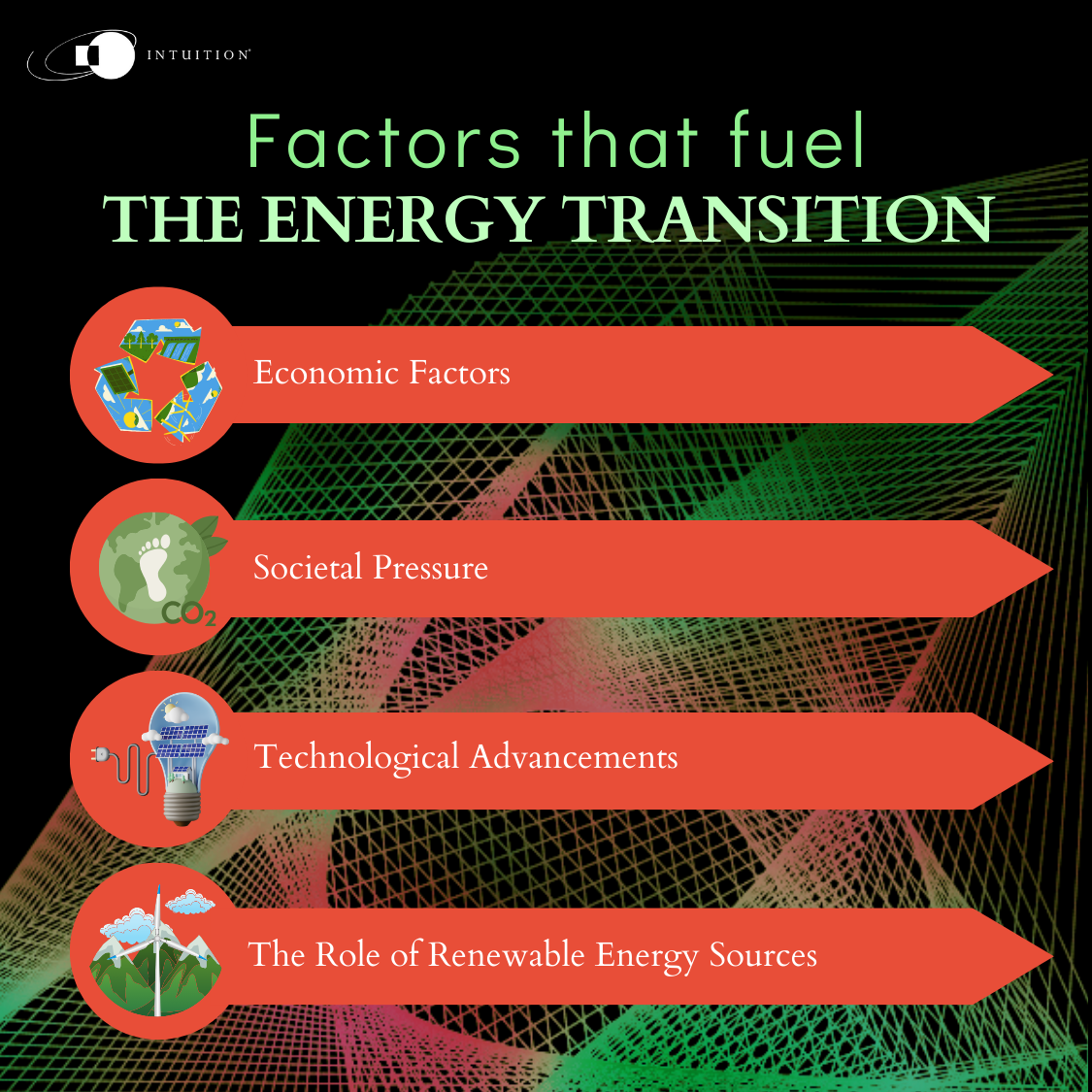Introduction to the energy transition

In recent years, the world has seen significant shifts in the global energy sector. One of the most significant changes has been the transition toward a low-carbon energy future, fueled by economic factors, societal pressure, and technological advancements. This transformation, known as the “energy transition”, is reshaping the global energy sector.
The energy transition sees a shift from fossil fuel-based systems of energy production and consumption to such renewable energy sources as wind and solar power. This shift is not only essential for mitigating the impacts of climate change but also offers tremendous economic opportunities.
Economic factors influencing the transition towards a low-carbon energy future
The transition toward a low-carbon energy future is significantly influenced by economic factors. The cost of renewable energy technologies has dropped dramatically over the past decade, making them a more economically viable option than fossil fuels in many regions. Furthermore, the depletion of fossil fuel reserves and the associated price volatility have increased the attractiveness of renewable energy.
In addition to reducing greenhouse gas emissions, the transition to a low-carbon energy future also provides an opportunity for economic growth. The development and deployment of renewable energy technologies can create jobs, stimulate innovation, and foster economic resilience. Moreover, the shift to a low-carbon energy future can also lead to significant health and environmental benefits, which can further contribute to economic savings.
Societal pressure driving the energy transition
Societal pressure is another crucial factor driving the energy transition. As the impacts of climate change become more apparent, there is growing public demand for action. People are increasingly recognizing the need for a sustainable energy future and are pushing strongly for governments and businesses to take action.
Furthermore, the transition toward a low-carbon energy future aligns with many societal values, such as sustainability, social justice, and energy security. The shift to renewable energy can help reduce energy poverty, promote social equity, and enhance energy independence, which is particularly important for energy-importing countries.
Technological advancements enabling the energy transition
Technological advancements have played a pivotal role in enabling the energy transition. Innovations in renewable energy technologies, energy storage, and energy efficiency have made it possible to shift away from fossil fuels and toward a low-carbon energy future.
For instance, advances in solar and wind technology have significantly reduced the cost of these renewable energy sources, making them competitive with fossil fuels in many regions. In addition, improvements in energy storage technologies, such as batteries, have made it possible to overcome the intermittent nature of renewable energy.
The role of renewable energy sources in the energy transition
Renewable energy sources play a critical role in the energy transition. They offer a viable alternative to fossil fuels and can help reduce greenhouse gas emissions. Given their abundance and decreasing costs, renewable energy sources such as wind and solar power are becoming increasingly important in the global energy mix.
In addition to mitigating climate change, renewable energy sources also offer other benefits. For instance, they can enhance energy security by reducing dependence on fossil fuel imports. Moreover, the deployment of renewable energy technologies can stimulate economic growth and job creation.

Economic impacts of shifting from fossil fuels to renewable energy
The shift from fossil fuels to renewable energy has significant economic impacts. On the one hand, it can lead to job losses in fossil fuel industries. On the other hand, it can create new jobs in renewable energy industries.
Moreover, the transition to a low-carbon energy future can stimulate economic growth. By investing in renewable energy technologies, countries can foster innovation, enhance energy security, and reduce exposure to fossil fuel price volatility.
Successful transition toward a low-carbon energy future
Several countries have successfully transitioned toward a low-carbon energy future. For instance, Denmark has significantly increased its share of wind power in its energy mix, while Germany has made substantial progress in solar power deployment.
These countries have demonstrated that the transition toward a low-carbon energy future is not only feasible but also economically beneficial. They have created jobs, stimulated economic growth, and reduced their greenhouse gas emissions.
Challenges and opportunities in the transition toward a low-carbon energy future
Despite the numerous benefits, the transition toward a low-carbon energy future also presents challenges. These include technical challenges, such as the intermittent nature of renewable energy, and socio-economic challenges, such as job losses in fossil fuel industries.
However, these challenges also present opportunities. For instance, the need for energy storage solutions presents opportunities for innovation and investment. Moreover, the transition toward a low-carbon energy future can help address socio-economic issues, such as energy poverty and social inequity.
[Energy transition: How finance professionals can overcome challenges]
The future of energy: Predictions and trends
In the future, the transition toward a low-carbon energy future is expected to accelerate. This is due to the decreasing costs of renewable energy technologies, increasing societal pressure for climate action, and the economic benefits of shifting away from fossil fuels.
Moreover, new technologies, such as hydrogen and carbon capture and storage, are expected to play an increasingly important role. These technologies can further enhance the flexibility and sustainability of the energy system.
Conclusion
In conclusion, the transition toward a low-carbon energy future is not only necessary for mitigating climate change but also offers significant economic and societal benefits. This transition is being driven by economic factors, societal pressure, and technological advancements. By embracing this transition, countries can stimulate economic growth, create jobs, enhance energy security, and foster a sustainable future.


